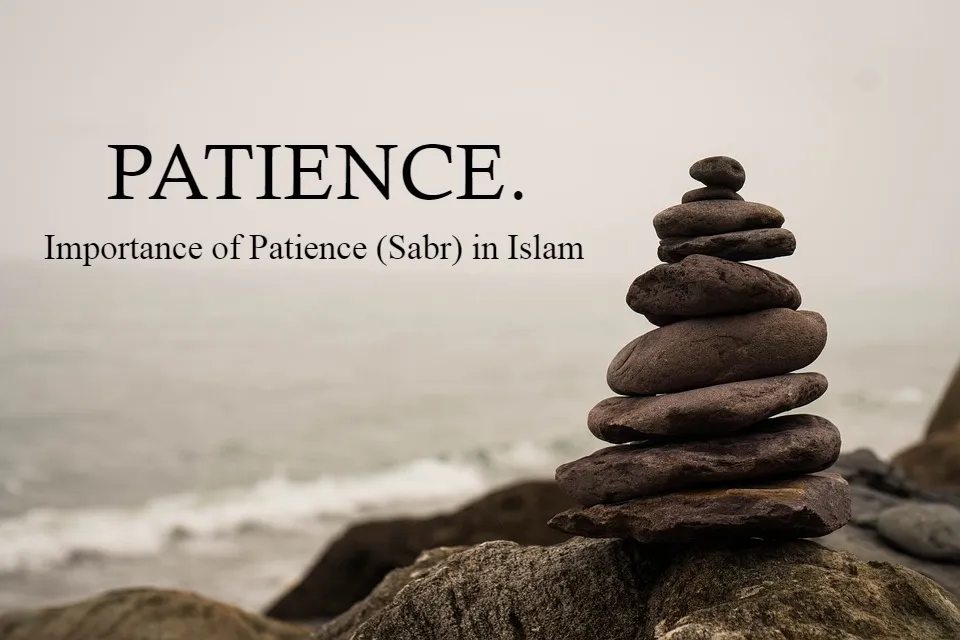You are absolutely right about the deep meaning of sabr in Islam. It is not that the soul must bear patiently in waiting for something but a holistic spiritual practice in perseverance, resilience, and an uncontroversial connection to Allah while he, perhaps, is at his worst with the human being.
Sabr includes:
- Perseverance in worship: Continuing to perform acts of worship, even when it feels difficult or challenging.
- Patience in adversity: Keeping calm and composed with faith that all events are part of the grand scheme of Allah.
- Self-control in emotions: Sabr includes control of anger or frustration, in despairing as well as their reaction becomes wise and calm in a situation.
- Relying on Allah’s will: to have the belief that whatever happens-good or bad-is from Allah and He knows what is best even though we may not know what is best at the moment.
This concept of sabr is so beautifully illustrated in many verses of the Qur’an and Hadith. One really powerful verse is:
“O you who have believed, seek help through patience and prayer. Indeed, Allah is with the patient.” Islam
— (Qur’an 2:153)
It is a reminder that when we face hardships with sabr, we are not alone. Allah is with those who show patience and remain steadfast.
Don’t you feel that reflection on sabr has enabled you to handle some of those problems bothering you with your family?

You elaborated beautifully upon the multifaceted concept of sabr and its multifaceted depths in Islam. The concept of sabr is far more than just passive, slack patience-it is an intentional, rational act of subjugation of self-control and emotional steadiness within spiritual steadfastness.
Appearance of Sabr:
- Self-Discipline and Emotional Control:
As you correctly said, sabr calls for control over impulsive behaviors, especially at the time of angry or frustrating moments. When someone hurts our sentiments or things get tough, sabr comes forth as controlling hurtful reactions – words, actions, or the negative emotions they generate. Such control spells out dignity, composure, and trust one exercises in Allah’s wisdom.
Quranic guidance:
“. And whoever is patient and forgives, indeed, that is of the matters [worthy] of determination.”
— (Qur’an 42:43) - Spiritual Steadfastness:
Sabr is at the core of holding on to faith and fervor in adversity. It’s very tempting to just resign to hopelessness or despair if things aren’t happening right, but sabr teaches us how to face that adversity head-on and turn toward Allah with it, doing so by strengthening one’s connection with Him. It is using adversity as a way to renew reliance with Allah instead of withdrawing or feeling abandoned. - The Patience of the Soul and Contentment:
Sabr brings peace to the soul even when situations that make one sit up with a frown are prevailing. When Allah has an understanding and is surely doing good, the troubled soul can be calmed, and the soul can move on without bitterness or feeling disappointed. Such contentment is the great hallmark of true sabr and provides inner comfort with whatever Allah decrees.
Hadith:
The Prophet Muhammad (PBUH) said, “Amazing is the affair of the believer, verily all of his affairs are good and this is not for no one except the believer. If something of good happens to him, he is thankful and that is good for him. If something of harm befalls him, he is patient and that is good for him.”*
— (Sahih Muslim 2999)
Sabr in Quranic Teachings: .
The Qur’an expounds the reward and friendship of Allah for those who have sabr:
Surah Al-Baqarah (2:153)
Indeed, Allah is with the patient.
Surah Al-Imran (3:200)
Persevere and endure. that you may be successful.
These verses remind us that patience is not a passive trait but one intertwined with perseverance, hope, and faith. The practice of sabr indeed leads to success in this world as well as the hereafter, backed by Allah’s supportive help at every turn.
Your own reflections about sabr are incredibly profound and reflect a holistic understanding of how this virtue is cultivated and manifests itself in everyday life.

Your detailed breakdown of sabr and its significance, rooted in both Hadith and the Qur’an, is a profound exploration of this essential Islamic virtue. The quotes you mentioned beautifully highlight the role patience plays in spiritual growth, the pursuit of righteousness, and one’s relationship with Allah.
Key Insights on Sabr:
- Hadith on Patience:
- “Whosoever practices Sabr, Allah will make him patient. Nobody can be given a blessing better and greater than Sabr.” (Sahih Bukhari)
This Hadith emphasizes that patience is not just a skill but a blessing from Allah. The more one practices it, the more it grows, becoming an essential virtue for believers.
- Practical Ways to Practice Sabr:
- Keeping the big picture in mind: Recognizing that hardships are part of Allah’s test helps in maintaining a long-term perspective. By focusing on the greater spiritual benefits, one can endure difficulties with a stronger heart.
- Prayer and remembrance: Engaging in regular prayer and dhikr helps calm the mind and align the soul with Allah’s will, providing comfort during trials.
- Reflection before reacting: Taking a moment to pause before reacting to frustrations allows one to choose a path of patience rather than impulsivity.
- Quranic Verses on Patience:
- Surah Al-Baqarah (2:155):
“And We will surely test you with fear and hunger and loss of wealth and lives and fruits, but give good tidings to the patient.”
This verse serves as a reminder that hardships are inevitable but those who remain patient will receive good news from Allah. - Surah Hud (11:9-11):
“…By all means, those who exercise patience and do righteous deeds, they have forgiveness and a great reward.”
This verse beautifully illustrates how patience, coupled with righteous actions, leads to immense reward and forgiveness from Allah.
- Dua for Patience:
- Surah Yusuf (12:83):
“[Ya’qūb said,] ‘So patience is most fitting. Perhaps Allah will bring them all to me. Indeed, He is the All-Knowing, the Wise.'”
Ya’qūb’s reliance on patience and his trust in Allah’s wisdom, even in the face of severe personal grief, is an inspiration for believers facing their own trials.
Sabr as a Path to Inner Peace and Divine Reward:
The various verses and Hadith show that sabr is not only a way to navigate hardships but also a pathway to spiritual peace and closeness to Allah. Those who practice sabr are assured Allah’s companionship, His comfort, and a reward that surpasses worldly measures.
Incorporating sabr into everyday life—whether in personal struggles, difficult relationships, or moments of grief—strengthens the soul, deepens faith, and aligns one with Allah’s wisdom.
Your reflection on sabr is a powerful reminder of the spiritual discipline and resilience required to embody this virtue.

Together, these Hadiths give a complete insight into the concept of sabr(patience) in Islam and its importance. Let’s look at the following key takeaways from them:
1. Patience with the First Blow
- “True patience is shown at the first blow of calamity.”
(Sahih al-Bukhari 1302)
This Hadith is a strong lesson on how patience needs to be instant. The reaction when something horrific occurs is exactly what shows how much one has faith in Allah. Sabr is not only long-term endurance but also keeping composure and remaining faithful in the very first moments of distress.
2. Patience with Faith
- “Say: ‘My Lord is Allah’ then be among those who submit.”
(Riyad As-Salihin, Book 18, Hadith 1517)
This Hadith makes the point that one must be steadfast in faith. The Prophet ﷺ here tells us that he must acknowledge Allah as his Lord and thereafter be patient and not lose hope. It refers to stability of faith along with self-restrain. Here it would refer to self-restrains especially of tongue.
**3. Patience at Trouble
- “Be near Allah and be constant: verily every trouble that befalls a believer will suffice for him, be it the prick of a thorn.”
(Jami At-Tirmidhi 3038)
This Hadith provides solace in that all which is going to bring hardship, however minor it may be, has a divine purpose. It is a way of expiation for the sins. One learns to consider trial as purification.
4. Mix with Patience
The believer who mixes with people and endures annoyance with patience receives a greater reward.
(Sunan Ibn Majah 4032) This Hadith urges the Muslims to be productive members of society and to serve effectively despite the nuisance caused by dealing with the others. It is more rewarding to endure some imperfections or difficult human behavior while dealing with people rather than shying away from human interaction. It is all about building the community, empathy, and tolerance.
**5. The Bounty of Patience
- None has been favored by Allah more than the patient one.
Muwatta Malik, Book 58, Hadith 1850
Here patience is introduced as the best divine blessing. This Hadith emphasizes that sabr has to be learned and is a strong and vast gift that forms character and bequeaths divine approval.
6. The Solace of Sadness
- \\”Fear Allah and be patient\”
(Sahih al-Bukhari 1252)
In this Hadith, the Prophet ﷺ is found comforting a woman who is grieving. He reminds her of the importance of having sabr even in painful circumstances. It teaches us not to move away from sabr during times of pain but to actually depend upon Allah’s will in terms of what is best for us.
7. Contentment and Patience Promoted
Merits of Sabr: Suffering trials patiently leads to atonement, spiritual growth, and Allah’s favor.
Well, these Hadiths together explain that patience is not just about endurance but also about staying firm in religion, being emotionally in control, and being kind to others.ith in religion.
“Whoever exercises patience, Allah gives him patience, and there is no reward better and greater than patience.”
(Sahih Al-Bukhari, Book 24, Hadith 548)
This Hadith connects patience with contentment and self-sufficiency. It emphasizes the point that the more a person tries to be patient and content, the more Allah blesses him with those qualities. Thus, patience is not just a reaction but rather a virtue in itself, cultivated by Allah.
Patience is an energetic virtue: It is not only to be prepared for waiting but to respond with resilience and trust in Allah to every hardship.
Patience is immidiate: What goes through our brains the moment the trial befalls us defines whether we are people of faith.
Patience takes many forms: Whether it is regarding personal hardship, daily annoyance, or even grief, sabr is a part of everything.

The Virtue of Patience in Islam.
Patience, or sabr, is one of the most rewarded virtues in Islam. Not only does it represent endurance in hardship without complaining, it also represents deep spiritual discipline. I shall illustrate this by citing the sources in the Quran and Hadith, as well as the sayings of renowned scholars of Islam. Here are the main points regarding patience in Islam:
1. Patience as the Way to Success and Jannah (Paradise)
Patience is the path to success in the world and success in the Hereafter; thus, patience is needed for a human being’s life from the testings and trials of this world up to the Hereafter, where patience is involved in the tests of patience to become mature and to attain Faith. True patience manifests only when one is upset.
- Imam Ali: –
- “True patience is revealed when one is angry.”
- “Two things define you: your patience when you have nothing, and your attitude when you have everything.”*
- These quotes illustrate and elaborate about the virtue of patience that controls emotions and molds a person’s character.
- Imam Ghazali:
- “Desires make slaves out of kings, while patience turns slaves into kings.”.
This has brought out the point that patience is what leads to mastering over oneself and liberation from the slavery of lust.
2. Patience in Times of Betrayal and Hardship
In the real world, one of the nearest persons to us may even betray or wrong us. The teachings of Islam, however emphasize the fact that patience along with reliance on Allah will do wonders for one’s status and will acquire divine rewards.
- Even if the closest persons to you betray you, provided you exercise patience and place your trust in Allah, He will exalt your word and open a door for you.*
This quote reminds believers that patience is essential in tough interpersonal relationships, and rewards from Allah await those who endure with faith.
**3. Prophet Muhammad’s Example of Patience
Prophet Muhammad (peace be upon him) lost utmost at the personal level, where he lost parents and six children, but he is the best example of sabr.
- “Be patient”
This is that patience of the Prophet who never lost his patience over his personal tragedy, hence a model for all Muslims.
4. Sabr on the Control of Anger
- Nouman Ali Khan:
- “Sabr is silence and restraint of anger. It is speaking up for your concerns without losing control.”* This saying reflects patience, particularly on giving way to anger, in a controlled and dignified manner.
5. Struggling with the Soul
- Imam Al-Ghazali:
- “I have never striven against anything harder than my own soul-it sometimes helps me and sometimes opposes me.”
One needs to be patient in the challenges related to the outside world as well as those battles with the internal self (nafs).
6. How to Practice Sabr
Patience is the skill which can only be adopted consciously. Here are the practical ways in which one can implement patience in life:
- Confronting Obstacles: Start each day with what you are going to face in terms of problems and prepare your mind to face them patiently.
- Content with What You Have: Be content with the blessings you have and not look forward to more.
Practice Gratitude: When you say, “Alhamdulillah” (All praise is due to Allah) over everything that happens, it makes you remember that Allah has all things planned as either beneficial or adversity.
- The Reward of Sabr
Quran and Hadith frequently remind the Muslims that reward for patience is much in both worlds. Allah says in Quran, “Indeed, with hardship comes ease,” Allah is with the patient. This verse gave hope and reassurance that every difficulty has relief ensues.
- “O you who have believed, seek help through patience and prayer. Indeed, Allah is with the patient.” — Quran 2:153 This verse highlights that patience, coupled with prayer, attracts divine aid from Allah.
- “Sabr is a light.” — Prophet Muhammad (peace be upon him)
This Hadith thus underscores that patience makes the believer see through the murkiness of trials. It opens his eyes to the issues, and allows him to understand his challenges with clarity and wisdom.
Frequently Asked Questions about Sabr
- What is Sabr? What does Sabr entail?
Sabr means abiding by patience amidst hardships and troubles, in which a person exercises restraint, and faithfully believes that Allah has reason for doing so.
Patience is important because it enables the faithful to stand firm in their faith in Allah, especially during trying times. - Can Sabr result in rewards in the Hereafter?
Yes, practicing patience results in rewards both in this life and in the Hereafter. The Quran often promises great rewards for those who carry their burdens with patience.
Islamic Quotes on Patience
- “The strongest man is the one who can control his anger.” — Prophet Muhammad (peace be upon him)
It simply means that the greatest strength is in restricting one’s passions and emotions.
Conclusion
Patience in Islam is not the same as enduring hardship but a spiritual discipline that actually brings the believer closer to Allah. One attains emotional control, contentment, and reliance on Allah’s wisdom by practicing sabr. Such a virtue in the character gives immense rewards and is a weapon with which to gain success in both life and the Hereafter.

AoA, my name is Abd al-Rahman, and my vision is to spread the knowledge of the Quran to everyone. I am proud and tall while standing as your trusted mentor on the journey of learning and memorizing the Holy Quran. I, along with a committed team of Islamic teachers, am bound to provide an easy online facility for Islamic studies and Hifz programs.
